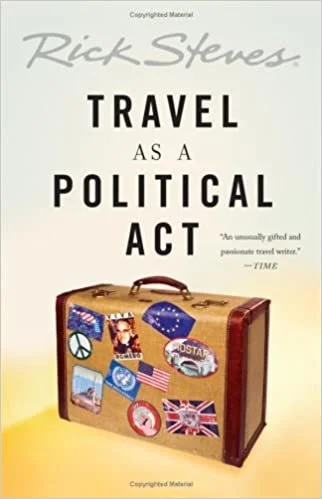Travel as a Political Act
Rick Steves is well known for his travel guidebooks and shows on public television, urging travelers to experience cultures “through the back door,” rather than just making obligatory stops for photo-ops at a few crowded tourist traps and corresponding kitschy gift shops. For nearly 40 years his work has focused primarily on Europe, which he says provides an excellent gateway for Americans wanting to experience other cultures, but who aren’t quite ready for the full dose of culture shock that may await them elsewhere.
In Travel as a Political Act, Steves makes clear that there’s a lot more to his passion for travel than the mere novelty of eating local delicacies or visiting ancient historical sites. For him, travel is a way of connecting people across the otherwise seemingly insurmountable chasms of culture, politics, and religion – the very factors at the center of so much global turmoil.
With chapters focusing on various parts of Western Europe as well as Iran, Turkey, Morocco, El Salvador and the former Yugoslavia, the book more or less takes as its credo Mark Twain’s famous words from Innocents Abroad: “Travel is fatal to prejudice, bigotry, and narrow-mindedness, and many of our people need it sorely on these accounts. Broad, wholesome, charitable views of men and things cannot be acquired by vegetating in one little corner of the earth all one’s lifetime.”
Steves says his thinking about “travel as a political act” is the culmination of his decades of experience, but that it really came to fruition in the aftermath of the attacks of 9/11. The events of that terrible day made clear that Americans could no longer maintain the myth of isolation or immunity from the world’s events. Rather, only by traveling and experiencing the vibrancy and heartache of the world around them could Americans build bridges with vastly different cultures.
A self-described Lutheran and political liberal, Steves wears his convictions and opinions on his sleeve, but he does so with a refreshing degree of humility and grace. While not everyone will agree with his conclusions on matters like the legalization of drugs and prostitution in Europe, or the role of the United States in El Salvador’s civil war, one would be hard-pressed not to respect his intellectual process as he wrestles through minefields of controversial and complex real-world themes.
“Travel,” Steves writes, “has taught me the fun in having my cultural furniture rearranged and my ethnocentric self-assuredness walloped. It has humbled me, enriched my life, and tuned me in to a rapidly changing world. And for that, I am thankful.”
While Steves has dedicated much of his life to international travel and to encouraging others to do the same, he says that “the happiest day of any trip is the day I come home.” Indeed, travel not only nurtures an appreciation for the rich cultural diversity in our world, but very often leads to gaining a new appreciation for our own homeland.
But that doesn’t mean blindly accepting everything our nation and our neighbors do. “Holding our country to a high standard and searching for ways to better live up to its lofty ideals is not ‘America-bashing,’” Steves says. “It’s good citizenship.”
Note: this book review was written for the ePistle, a weekly online publication from Evangelicals for Social Action, and is shared here with permission.
